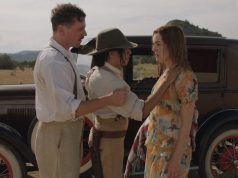Consider the life of a stunt double. Your job is to do anything that’s too dangerous for the star, who is, by implication, more important, more attractive and more talented than you. In a particularly action-heavy program, your body is seen almost as such as your counterpart’s. And for all this, what do you get? A paycheck, a lot of bruises, and your name listed deep down in the credits where no one notices it. Meanwhile, the star goes on talk shows and whines about how grueling the shoot was for him or her — never mind that the cameras stopped rolling before the real dangerous stuff happened so that you could step in and take the fall.
It’s the thrill that attracts people to this profession, obviously, not the fame or glamour. And it attracts women, too, or at least it has in the last half-century or so. (Before that, stunts for female characters were generally performed by male actors in drag.) “Double Dare” is a charming little documentary that focuses on two specific women: The stunt double for Xena and the stunt double for Wonder Woman. (Camp-happy lesbians, THIS IS YOUR MOVIE!)
Zoe Bell is a rough-and-tumble, very pretty New Zealander, a lifelong tomboy who had the job of a lifetime when “Xena: Warrior Princess” filmed there for six years. As Lucy Lawless’ double, she had the unenviable duty of flying, spinning, kicking and fighting in Xena’s costume — bare arms and legs, no place to hide any protective padding.
Jeannie Epper, Lynda Carter’s double in the “Wonder Woman” days, points out another downside: She had to run around in boots with heels until the costumers finally relented and gave the character more manageable footwear.
Jeannie is pushing 60 now, but still active in the stunt industry. She knows all the Hollywood casting directors by name and calls them regularly to see if they need any golden-year women to be knocked over by fleeing suspects pursued by Dennis Franz, or to dive out of the way of careening Chris Tucker-driven automobiles. The answer, increasingly often, is no, but the casting directors always seem pleased to hear from their old friend Jeannie.
She comes from a stunt family. Her father was Johnny Epper, whose name means nothing to you or me but who was one of the top stuntmen of his day. Her brother Gary is in the business, and so is her daughter Eurlyne. Steven Spielberg reports that “in the bar fight in ‘1941,’ there were Eppers flying everywhere.” (I guess it makes sense, given it was his movie, but I didn’t know ANYONE had ever watched “1941.” More memorably, Epper was Kathleen Turner’s stunt double for the famous sliding-down-the-mud scene in “Romancing the Stone.”)
“Double Dare” follows Zoe and Jeannie’s unrelated stories for a while before bringing them together. After “Xena” shoots its final episode, Zoe is out of work in a country where there is not an abundance of stunt work available. (I’m not certain of the timing, but I believe she would have missed the “Lord of the Rings” window due to her “Xena” obligations — but those films didn’t have much call for stuntwomen anyway, relying mostly on men and CGI.) Jeannie, meanwhile, is still plugging away, and is working to build up prestige for the Stuntwomen’s Association of Motion Pictures Inc. that she co-founded, and helping put together the 2001 World Stunt Awards, the Oscars of the stunt industry.
Zoe’s invited to the ceremony, and she and Jeannie become friends. Soon the elder is helping the younger get into training sessions and putting her in touch with casting directors. Quentin Tarantino is about to shoot “Kill Bill,” and guess who’s a dead ringer for Uma Thurman?
“Double Dare,” directed by Amanda Micheli, is a congenial doc, warm toward its subjects and friendly to its guests. (Lawless and Carter make appearances to talk about their doubles.) It is not, however, very expansive. The focus is on Jeannie and Zoe specifically, with only passing attention given to the industry in general, or even to the subset of female stunt workers. I wonder if the film might have been more interesting if it had widened its scope a bit — but still, Jeannie and Zoe are likable gals, rugged and vigorous, but feminine in their own ways.
B (1 hr., 21 min.; )





